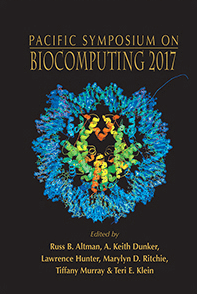
Lana Garmire1, Stephen Gliske2, Quynh C Nguyen3, Jonathan H. Chen4, Shamim Nemati5, John D. Van Horn6, Jason H. Moore7, Carol Shreffler8, Michelle Dunn9
1Epidemiology Program, University of Hawaii Cancer Center
2Department of Neurology, University of Michigan
3Department of Health, Kinesiology and Recreation, University of Utah
4Department of Medicine, Stanford University
5Department of Biomedical Informatics, Emory University
6Mark and Mary Stevens Neuroimaging and Informatics Institute, University of Southern California
7Institute of Biomedical Informatics, University of Pennsylvania
8National Institute of Environmental Health Sciences
9Office of the Associate Director for Data Science (ADDA), National Institute of Health
Email: LGarmire@Hawaii.edu
Pacific Symposium on Biocomputing 22:640-645(2017)
© 2017 World Scientific
Open Access chapter published by World Scientific Publishing Company and distributed under the terms of the Creative Commons Attribution (CC BY) 4.0 License.
With the booming of new technologies, biomedical science has transformed into digitalized, data intensive science. Massive amount of data need to be analyzed and interpreted, demand a complete pipeline to train next generation data scientists. To meet this need, the trans-institutional Big Data to Knowledge (BD2K) Initiative has been implemented since 2014, complementing other NIH institutional efforts. In this report, we give an overview the BD2K K01 mentored scientist career awards, which have demonstrated early success. We address the specific trainings needed in representative data science areas, in order to make the next generation of data scientists in biomedicine.